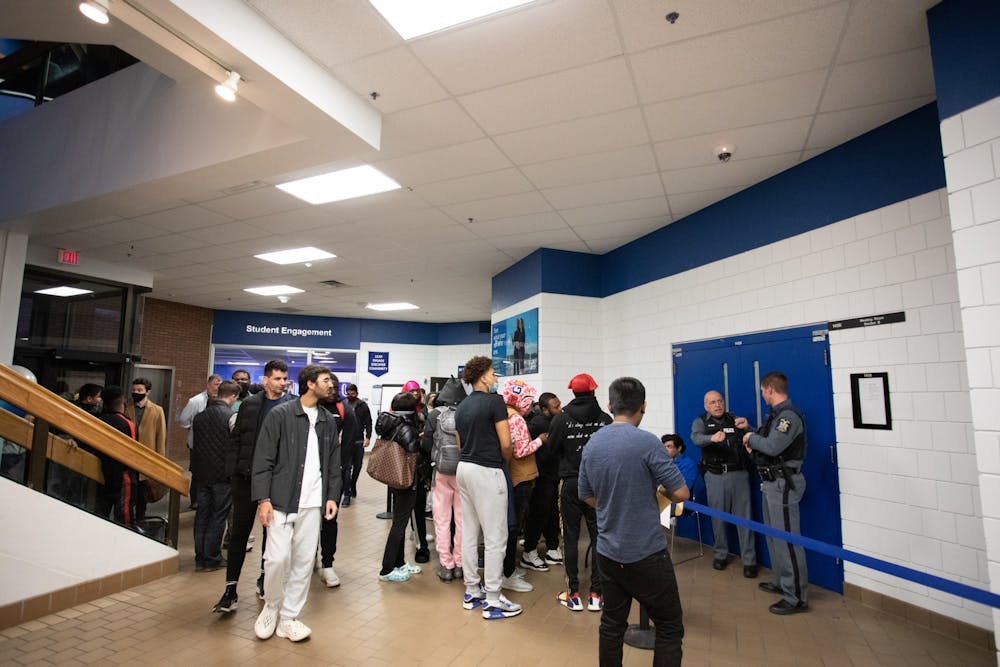UB has commenced a “thorough [internal] review of events and activities” surrounding Lt. Col. Allen West’s controversial on-campus speech on April 7, according to a university statement.
University Police are also conducting their own parallel investigation.
The announcement follows anonymous online threats made toward student protestors on Yik Yak and allegations of violence made in the aftermath of the event.
“These events do not define who we as a university are, nor do they define who we aspire to be,” Barbara Ricotta, UB’s dean of students, said in a statement on April 8. “As a university community, we will continue to strive to be a place where all students can express themselves, be heard and live their lives in a welcoming and safe environment that values diversity and inclusion.”
To that end, the university is trying to engage the student body in an open dialogue over its speaker and protest policies, UB spokesperson John DellaContrada told The Spectrum in an email.
“As part of its review, the university is meeting with student leaders to discuss their concerns and the university’s expectations and policies regarding public events and peaceful protest,” DellaContrada said.
Young Americans for Freedom, an SA-recognized conservative student organization, invited West (R-TX), a former U.S. Representative and retired U.S. Army lieutenant colonel, to deliver a speech titled “America is not Racist — Why American Values are Exceptional.”
Dozens of students rallied and marched through the Academic Spine on the afternoon of the speech to voice misgivings about the rhetoric on campus.
The event garnered national attention, with YAF student organizers alleging that some protestors assaulted them following the speech, according to WCIV.
However, no formal report of assault has been made since the event. Three reports of harassment have been filed to campus police, DellaContrada said.
YAF president Therese Purcell declined an interview request with The Spectrum.
University Police are also investigating threatening Yik Yak posts made against student protestors prior to the speech. Campus police have also reached out to the FBI’s Hate Crime unit for assistance.
The university defends its decision to allow YAF to invite West to speak on campus, saying that SA-sponsored organizations have the freedom to “invite speakers of their choosing” as long as they abide by university guidelines and corresponding state laws. UB also says it does not “take a position on the views expressed by those who visit its campus.”
University administrators cited limitations set in place by the First Amendment, which prevents public universities from prohibiting registered student organizations and their guests from speaking on campus, even for hate speech. “True threats” — speech that can be perceived as an immediate threat to one’s physical safety — incitement of illegal activity, and harassment are not protected under the First Amendment .
Other universities that have attempted to ban speakers for hate speech were met with legal backlash. In 2017, Auburn University, a public institution in Alabama, decided to cancel a speaker event organized for white supremacist Richard Spencer. A federal court overruled the decision, deeming it unconstitutional. Spencer was permitted to speak.
Instances of hate speech and hate crimes constitute growing issues at UB and on campuses nationwide. Reports of hate crimes on college campuses have risen by about 57% over the past decade, according to a survey by the Federal Office of Postsecondary Education’s Campus Safety and Security. At the end of the last semester, University Police opened investigations into anti-semitic and racist posters found on campus.
Kyle Nguyen is an assistant news/features editor and can be reached at kyle.nguyen@ubspectrum.com

Kyle Nguyen is a senior news/features editor at The Spectrum.





